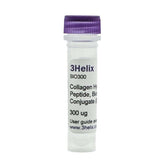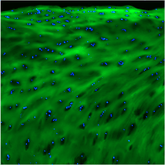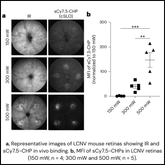CHPs as Targeting Drug Delivery Agent in Osteoarthritis
Osteoarthritis (OA), a debilitating degenerative joint disorder, is characterized by progressive cartilage degradation. Current treatments for osteoarthritis focus on managing symptoms like pain and stiffness through medications (oral and topical), physical therapy, exercise, supportive devices, and sometimes joint injections or surgery in severe cases, with currently no cure to reverse cartilage damage. In the...
View Details
Visualizing Mast Cell-Driven Collagen Damage in nAMD Progression
Collagen Hybridizing Peptides track mast cell-driven collagen remodeling & degradation in neovascular Age-related Macular Degeneration (nAMD) research. Explore the study's key insights and learn about how you can target damaged collagen for insights in your research!
View Details
Collagen Hybridizing Peptides Validate a Novel Bone Organoid Model
Validate collagen integrity in your biomaterials with 3helix CHPs. Discover how Collagen Hybridizing Peptides (CHPs, 3Helix Inc.) ensure reliable data in tissue engineering and bone remodeling research.
View Details
Beyond Fibroblasts: CHPs provide Key Evidence for Keratinocyte-Driven Skin Development
Collagen is skin's foundation, but how it's truly built has been hidden – until now. Discover how see-through axolotls are providing an unprecedented window into this process, revealing secrets that could reshape skin science.
View Details
Collagen Hybridizing Peptide Detects Excess Collagen Degradation in Periodontal Ehlers-Danlos Syndrome Fibroblasts
Ehlers-Danlos syndrome (EDS) is a cluster of connective tissue disorders with a range of manifestations across organ systems. Periodontal EDS (pEDS) is a form of EDS characterized by weakening tissue around the teeth, leading to fragile gums, gingival recession, and tooth loss. pEDS has been linked to heterozygous missense mutations in the genes...
View Details
First Empirical Evidence of Collagen Damage during Bone Fracture
Bone is a remarkable material, strong enough to withstand impressive forces without fracturing. Despite decades of research, however, our understanding of the molecular mechanisms underlying bone’s fracture resistance has remained incomplete. It has long been hypothesized that collagen degradation occurs following bone fracture. Until recently, this hypothesis lacked empirical evidence due to a...
View Details
Skeletal muscle fibrosis is associated with decreased muscle inflammation and weakness in patients with chronic kidney disease
Chronic kidney disease (CKD) progressively impairs kidney function, affecting millions. Beyond kidney-related complications, patients often experience muscle weakness and reduced mobility, begging the question: does muscle fibrosis contribute to those limitations? Figure 1 demonstrates a significant increase in collagen deposition within the vastus lateralis muscle of CKD patients. Histochemical analysis using picro-sirius red...
View Details
Advancing Intervertebral Disc Degeneration Assessment with Collagen Hybridizing peptides: A Fast, Accurate Approach for Research and Clinical Applications
Intervertebral disc (IVD) degeneration is a significant contributor to lower back pain, a leading cause of disability in individuals over 45. IVD is marked by the degradation of collagen and the extracellular matrix, which triggers inflammatory responses, recruits macrophages, and accelerates degeneration. Monitoring the progression of IVD degeneration and assessing the effectiveness...
View Details





































